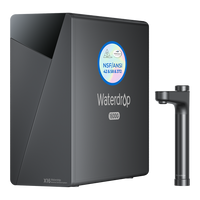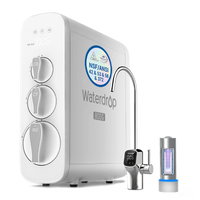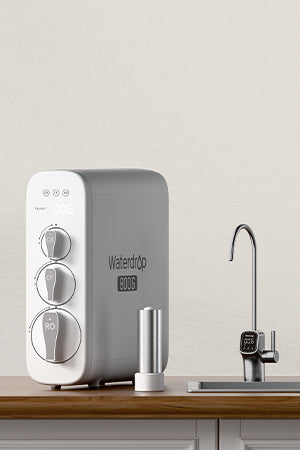Importance of water filter
Over the past few years, more and more people have discovered problems with our tap
water supplied from local water utilities. The water issues range from bad taste and odor to serious water
contamination. The Newark citizens are victims in the lead water crisis. You can learn more about the news here:
Is Newark Winning The War of Drinking Water Lead Reduction? Thus, water treatment for home has become a popular
option for many people in the U.S.
In today’s article, we will talk about the signs that you need a home water
treatment appliance and how does water filter solves these water problems.
Water tastes bad
If you notice an obvious
bad taste or smell from your drinking water, there’s a big
warning sign that your water has been contaminated. The weird taste of water can be generated from many sources.
The five most common bad water tastes include sulfur odor, sewage odor, wet dog odor, salt taste, and sweet
taste.
The main causes of the bad tastes are the different bacteria in the draining or
piping system, heavy metal trace as well as chemical residue from city water treatment. The bad taste and odor
normally would not have immediate effects but might be very harmful to human bodies if consume for a long time.
Depending on the cause of the funny taste, water contaminants can be physically
removed by water filtration systems. For example, water filters using activated carbon can adsorb chlorine,
lead, heavy metals and other major pollutants in water. The activated carbon filters are proved to be one of the
most effective water purification methods to improve water taste. Learn how does activated carbon remove odor
from this blog:
All You Need To Know About Activated Carbon For Water Filtration.
Too much soap scum
Soap scum is the white or grey color film layer that sticks onto the surfaces of your sink or anywhere else in your bathroom. The cause of soap scum is mainly due to the hard water that contains rich minerals. When using soap with hard water, soap would interact with the minerals in tap water and form into a solid substance.
Soap scum is quite tricky to remove as it is a precipitate that cannot be dissolved in water. Therefore, to solve this problem fundamentally, it is recommended to soften the tap water and reduce the number of minerals in it. Many homeowners who live in areas with hard water have chosen to install a home water softener.
The
water softener is a type of home water treatment system that aims to remove calcium, magnesium, and other minerals from water. The system uses ion exchange technology to exchange calcium and magnesium for sodium or potassium. Home water softeners are by far the most effective way to reduce the hardness of the water. If you are frustrated in dealing with the problems brought by hard water, then the home water softener would be the answer.
Your house was built in the last century
For houses or apartments that were built in the last century, the chances of having corroded pipes are quite high. Pipes that were made out of lead is the worst problem as the
corroded lead particle in water can cause severe health problems. Lead pipes are now banned in the U.S. but still exist in houses or apartments that were built a long time ago.
The famous
water crisis in Flint, Michigan was caused by lead contamination. According to a report by The Washington Post, there are 274 water utilities that have exceeded the EPA’s lead standard and about 11.5 million consumers are affected. Though the government has accelerated the speed of replacing lead pipes, lead contamination cases are still being reported recently.
Besides the old lead pipes, though most water pipes nowadays are made of galvanised iron/steel, copper, and some PVC plastics, almost all metal pipes will corrode. The rate and extent of corrosion depends on the characteristics of the metal as well as the environment. Therefore, it is important to have a water filtration system at home to remove the harmful heavy metals from the drinking water.
The recommended home water treatment systems are reverse osmosis systems, which can reduce heavy metals effectively. Our latest blog introduces reverse osmosis technique in details:
What Is a Reverse Osmosis System and How Does It Work.
Use well water as the source
For people who live in areas that have no access to municipal water, well water can provide endless water supply at a very low cost. Though there are benefits of using well water as the main water source, the risks of well water cannot be ignored.
Unlike city water that gets treated in the water treatment plant, water from individual wells can contain bacteria, viruses, heavy metals, and other commonly found water contaminants. This blog
Is Well Water Safe to Drink? has discussed risks of drinking well water. Therefore, it is absolutely necessary to install a water filtration system to remove the impurities from well water before use.
When using well water with any home appliances, a pre-filter is recommended to prevent appliances from scale building up or clogging. Water filtration systems like the gravity water filter are good to use after the pre-filter.
Itchy and dry hair
For many people who suffer from itchy and dry scalp, the cause of the problem is probably the hard water. Hard water is water that contains a high level of calcium and magnesium that comes from limestone, chalk or marble deposits. Hard water leads to dandruff, dry hair as well as dry skin.
The dry, dull hair and itchy scalp are some immediate effects of hard water. When using hard water for a period of time, many people reported having obvious hair loss problems. The soap scum that appears around the surface of bathrooms is another problem caused by hard water, which we have discussed above.
To combat the effects of hard water, you can install a home water softener system to treat the water and solve the problem from its nature. If you would like to soften the drinking water, you can choose water filter pitchers with the TDS reduction feature, which can effectively remove the excess minerals in water and lower the “hardness.”






































































